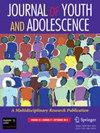同理心是青春期同伴影响与亲社会行为之间关系的中介:一项元分析
IF 3.6
1区 心理学
Q1 PSYCHOLOGY, DEVELOPMENTAL
引用次数: 0
摘要
在青少年时期,同理心和亲社会行为有助于建立积极的人际关系和社会联系,促进青少年的全面发展。大量研究提供了令人信服的证据,证明同伴关系与移情和亲社会行为之间存在关系。移情作为一个关键的中介因素,将同伴的影响与青少年的亲社会行为联系在一起,但目前还缺乏有关这一中介作用的有力的元分析证据。本研究采用了两阶段结构方程建模法来综合现有的关于青少年时期同伴影响、移情和亲社会行为的研究。我们在三个数据库(PubMed、Web of Science 和 PsycINFO)中进行了系统检索,共发现了 49 项研究,并对研究质量进行了系统评估。结果表明,移情在同伴影响和亲社会行为之间起着中介作用。积极的同伴影响与移情和亲社会行为呈正相关,而消极的同伴影响与移情和亲社会行为呈负相关,移情与亲社会行为呈正相关。这项荟萃分析表明,在青少年时期,移情在同伴影响与亲社会行为之间起着中介作用,是解释同伴影响与亲社会行为之间关系的一个潜在过程。本文章由计算机程序翻译,如有差异,请以英文原文为准。
Empathy as a Mediator of the Relation between Peer Influence and Prosocial Behavior in Adolescence: A Meta-Analysis.
During adolescence, empathy and prosocial behavior contribute to the establishment of positive interpersonal relationships and social connections, promoting holistic development in youth. A substantial amount of research has provided compelling evidence that there is a relationship between peer relationships and empathy and prosocial behavior. Empathy, as a key mediating factor, links the influence of peers with prosocial behavior in adolescents, yet there is currently a lack of robust meta-analytic evidence regarding this mediating role. This study employed a two-stage structural equation modeling approach to synthesize existing research on peer influence, empathy, and prosocial behavior during adolescence. Systematic searches were conducted across three databases (PubMed, Web of Science, and PsycINFO), identifying a total of 49 studies, with a systematic assessment of study quality. The results indicated that empathy plays a mediating role between peer influence and prosocial behavior. Positive peer influence is positively correlated with empathy and prosocial behavior, while negative peer influence is negatively correlated with empathy and prosocial behavior, and empathy is positively correlated with prosocial behavior. This meta-analysis demonstrates that during adolescence, empathy mediates the connection between peer influence and prosocial behavior, representing a potential process that can explain the relationship between peer influence and prosocial behavior.
求助全文
通过发布文献求助,成功后即可免费获取论文全文。
去求助
来源期刊

Journal of Youth and Adolescence
PSYCHOLOGY, DEVELOPMENTAL-
CiteScore
8.20
自引率
6.10%
发文量
155
期刊介绍:
Journal of Youth and Adolescence provides a single, high-level medium of communication for psychologists, psychiatrists, biologists, criminologists, educators, and researchers in many other allied disciplines who address the subject of youth and adolescence. The journal publishes quantitative analyses, theoretical papers, and comprehensive review articles. The journal especially welcomes empirically rigorous papers that take policy implications seriously. Research need not have been designed to address policy needs, but manuscripts must address implications for the manner society formally (e.g., through laws, policies or regulations) or informally (e.g., through parents, peers, and social institutions) responds to the period of youth and adolescence.
 求助内容:
求助内容: 应助结果提醒方式:
应助结果提醒方式:


